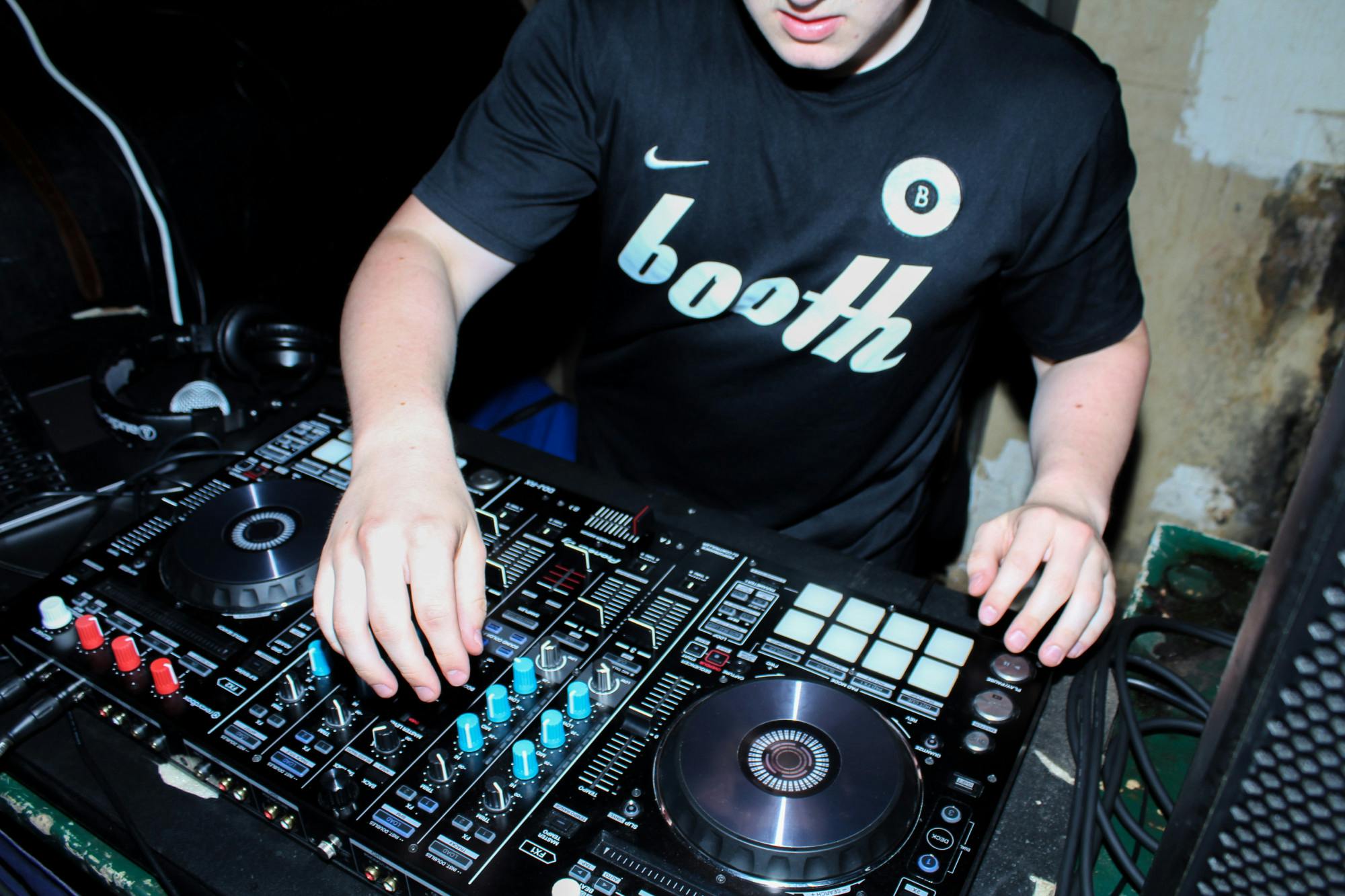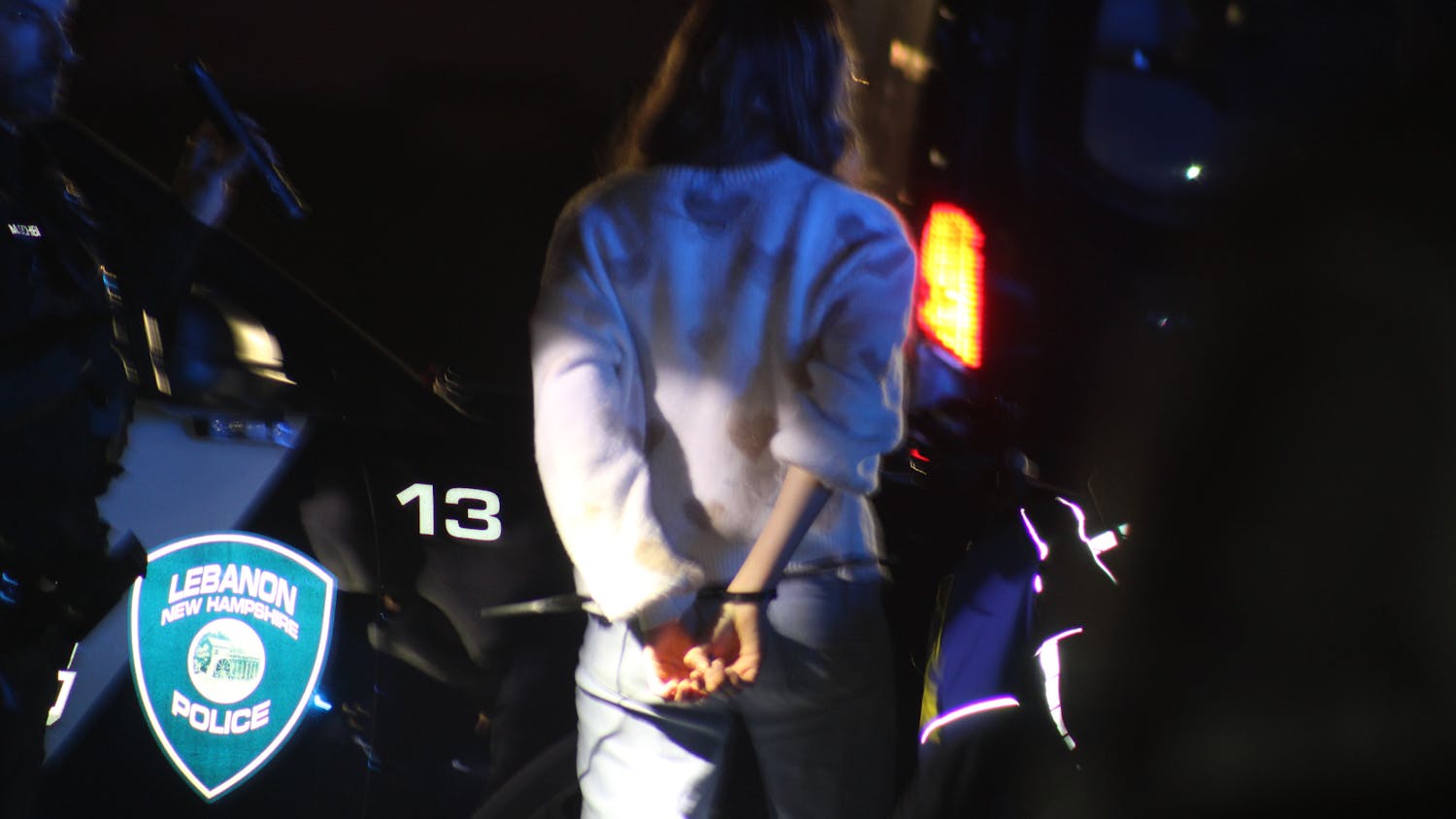In addition to the numerous student bands, student DJs make sure that music is always pumping throughout campus. DJ culture on campus draws on the efforts of individual DJs, collectives and clubs introducing students to DJing. Disc jockeys on campus said the College’s music scene depends on the craft of student performers and their individual styles. Student DJ Spencer Watson ’25, whose DJ name is Spence, said that the DJ community on campus is stylistically diverse.
“The cool thing about the DJ scene on campus is that…every DJ plays differently,” Watson said.
Watson explained that DJs’ styles are often influenced by their interactions with the crowd and how the audience reacts to song choices. The set’s location and the DJ’s proximity to the crowd can also affect the DJ’s choices: Watson said his favorite experiences are in boiler rooms — rooms where the DJ plays in the middle of the room instead of on a stage — because he is closer to the audience.
“Some [DJs] like to play what they want to play a little bit more than what the crowd wants [them] to play,” Watson said “Style also comes from how you mix, and [how] you get involved in the actual scene.”
While many student DJs are independent, the College has a DJ collective that students can join. Founded in 2016, DJ collective Booth’s mission is to provide high quality DJ services to the Dartmouth community. Booth functions as an arts group and social club in which upperclassmen typically train underclassmen on the technical and performance-based skills of DJing.
Booth member Charles Ambrose ’25 explained that Booth events function as both a show for concert goers and a training session for new DJs. Collaboration between members of Booth is not uncommon. In fact, Ambrose and fellow Booth member Aedan Brundrett ’25 said they have performed together as the “Crossfader Crusaders.” Ambrose added that Booth recruits three to four new members each year. The winter term serves as a training term for the recruits, while the spring term is for onboarding new members.
Because Booth connects DJs with venues and organizes shows, Ambrose said he considers Booth a “hub” for DJs.
“A lot of people on campus know the Booth name in some capacity,” Ambrose added.
Brundrett elaborated on the technical training involved with DJing. For instance, Brundrett said that a critical element of being a DJ is the ability to solve technical problems in seconds.
“If there’s more than 10 seconds of silence … the crowd will turn on you intensely,” Brundrett said. “If your power cuts out, if your laptop messes up, if anything happens, you need to be instantly ready to rectify that.”
According to Ambrose, another aspect of Booth’s training includes exploring music genres and learning to mix songs effectively into a set.
“One of the great things of Booth is training [DJs] not only how to deal in extreme situations, but also [teaching them] how to do the mundane things really well [like mixing],” Ambrose said. “I think doing that can seem really easy, but doing it well can be really tough.”
Raegan Padula ’24 explained that Booth meetings are collaborative, typically consisting of older members selecting a track that younger members will learn to blend into new tracks.
“We’ll beat-match their track and then figure out a good spot to bring it in and blend the two together,” Padula said. “We’re trying to encourage more of everyone being a tastemaker rather than playing top 40 hits over and over again.”
Padula explained how being a woman affects her DJing experience in Greek spaces that are often male-dominated.
“As a woman, there are places that I won’t play because I know I won’t have a good experience there … so I’m glad that we have more women and nonbinary people on campus DJing,” Padula said. “If you’re a marginalized group, you’re more interested in music that comes from a marginalized group, and that music challenges the norm more — which is how you get new culture.”
Jack Macy ’25, whose DJ name is DJ 2%, explained that his affiliation with Sigma Nu fraternity gives him a regular space and audience to practice his DJ skills.
“The reason I like [performing] at Sig Nu is because it’s very low pressure,” Macy said. “I’d feel bad if people didn’t stick around for a performance at another frat.”
Macy said his sets consist of songs that people want to sing along to, while some other student DJs play rave music. Brundrett added that the role of a DJ is to balance catering to the crowd’s preferences and introducing the crowd to new sounds.
“If we played the [song] requests every single time, then we wouldn’t be as much of performers as much as just Spotify playlists,” Brundrett said. “It goes back to the question of: What is the DJ there to do?”
Bundrett said he believes the role of DJ is flexible and involves playing requests and similar songs the DJ thinks the audience will find interesting.
Watson said that it is essential that a DJ knows how to read a crowd to infer what the audience might want to hear. Watson explained that reading a crowd comes down to three main principles: cheering, movement and capacity. In order to measure audience engagement, the DJ must be able to hear the volume of the crowd over the music to hear if they are cheering. Next, the audience’s movement will cue the DJ on the tempo of music to play. Finally, a DJ will measure the capacity of the room and how much time is left in the set.
“So what I’ll tend to do is look up every once in a while, and I’ll look around and make sure I have good engagement and capacity,” Watson said.
Aside from student performers, Dartmouth’s DJ scene also features some professional DJs. Professional DJs are typically invited during Dartmouth’s traditionally big weekends — such as Homecoming, Winter Carnival and Green Key — and through Friday Night Rock, a student organization dedicated to bringing alternative artists to campus. FNR has also collaborated with student DJs, who might open for visiting artists.
Elizabeth Tatishev ’25, FNR’s general manager, explained that FNR is considering holding DJ lessons for its members. Last winter, FNR invited Uklon — a group of DJs including some Dartmouth alumni — to perform on campus and share their expertise. During the visit, Uklon brought their decks, which are the hardware at the center of booths that allow DJs to mix songs.
“After the show, we had DJ lessons that even people outside of FNR came to and were interested in trying out the decks,” Tatishev said.“I think most of the interest [for DJing] within FNR is as a social activity — learning how to use the decks because we have a set of equipment.”
In reference to the future of DJ culture at Dartmouth, Brundrett said he hopes that DJing at Dartmouth will become more accessible.
“One thing that is potentially in the future is — whether it be through an adjustment of Booth or through another related organization — having a much more open, public-facing DJing group that is explicitly [trying] to train people who are questioning whether they want to get deeper into [DJing], and not having to demonstrate a crazy amount of commitment to try it out,” Brundrett said.
With the DJ scene at Dartmouth becoming more active, Watson offered advice to those interested in DJing.
“For the people who are worried to start and afraid of criticism, my biggest piece of advice, and the thing that I learned that was the most helpful was, ‘sometimes, you just have got to for it,’” Watson said. “You have to jump into it.”




